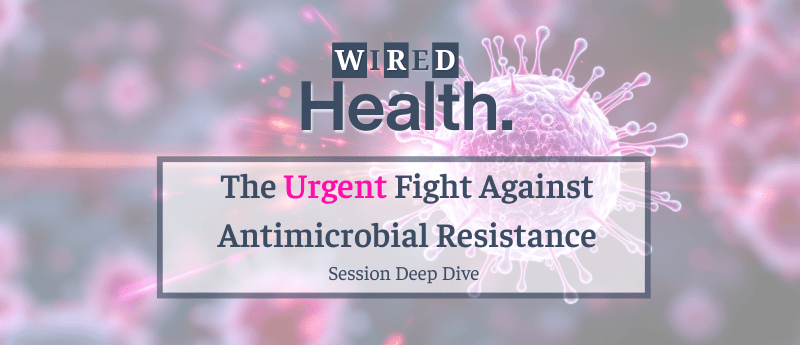WIRED Health 2025: The Urgent Fight Against Antimicrobial Resistance

The annual WIRED Health event promises to deliver the most exciting updates to the healthcare world, and this year was no exception. On the 18th of March 2025, leading experts in the field –scientists, doctors, and entrepreneurs alike– came together from across the globe to the city of London (UK), with one goal: to spark discussions on the rapidly changing healthcare landscape.
First to the stage was former Chief Medical Officer for England Dame Sally Davies, opening up the day by discussing one of the most pressing matters in modern medicine: Antimicrobial resistance (AMR).
Dame Sally is at the forefront of the battle against this deadly problem, appointed as the UK’s first-ever Special Envoy on AMR in 2019. She also serves as a member of the UN Global Leaders Group on AMR, collaborating with international experts to chart the fight against resistant superbugs.
She begins by posing a question to the audience:
“What if the future of our health system saw a return to the Victorian era, when a scratch from gardening or shaving resulted in infection, sepsis and death?”
If AMR is not addressed, this could very well be a reality we are hurtling towards.
AMR: One of the Biggest Threats to Human Health
The World Health Organization has declared AMR among the top global health and development threats, with resistant bacterial infections having contributed to the deaths of nearly five million people worldwide in 2019.
Concerningly, a 2024 study published in The Lancet predicted a 69.6% rise in AMR mortality by 2050, with those in the >70 years of age category forecast to be most affected. This equates to roughly 39 million deaths—of which, 11 million could be avoided by the development and deployment of new antibiotics.
“Many of us in the room are already grieving because of AMR.” says Dame Sally, before reflecting on her own personal loss: “My own goddaughter died just over two years ago [because of antibiotic resistance].”
Dame Sally goes on to consider the main reasons behind resistance, labeling it as a ‘one health’ problem that is influenced simultaneously by human, animal, and environmental health. She outlines the role of the ‘plastiphere’—a term coined in 2013 to describe persistent communities of bacteria sticking to microplastics in the environment. The plastisphere is an optimal breeding ground for microbes to mutate and pass on resistance mechanisms, exacerbating the spread of AMR.
She also touches on the consequences of displacement and conflict, with studies suggesting that war zones lead to elevated rates of AMR.
The Dire State of Antibiotic Development
Despite a looming AMR crisis, biopharma companies are reluctant to invest in new antibiotics. In fact, the last new antibiotic class was discovered 38 years ago in 1987. This is in part due to the major pharmaceutical giants abandonding the therapeutic space, since antibiotics are prescribed for short-term use and are not as profitable as conditions requiring prolonged treatment.

However, rather than solely focusing on bringing new antibiotics through the pipeline, Dame Sally stresses the need to improve global access to medicines that are already available, highlighting that impoverished regions are at a serious disadvantage when it comes to fighting infectious disease.
“We need innovation,” says Dame Sally, “but that goes hand-in-hand with access. A lot of people can’t access or afford the antibiotics they need.”
Cracking Down on AMR One Step at a Time
So, how are scientists confronting the issue?
With a target of a 10% reduction in global AMR deaths by 2030, a number of initiatives are in motion, both at the national and international scale.
Dame Sally notions to some of the core projects she has been involved in:
-
- The Fleming Fund. Designed to spotlight data on AMR, the Fleming Fund is a financial grant from the UK government that provides aid for up to 25 countries across Africa and Asia.
Since 2018, the organization has improved 279 laboratories’ capacities for AMR testing and set up 148 human health surveillance sites as AMR data hubs, unlocking crucial insights into the spread of resistance that can inform policy and practice around antibiotic use. - Commonwealth Partnerships for Antimicrobial Stewardship. A program within the Fleming Fund that partners British healthcare institutions with teams in Ghana, Uganda, Tanzania, and Zambia—connecting medical professionals across the globe to tackle pre-defined AMR goals.
- The Trinity Challenge. Dame Sally launched the Trinity Challenge in response to the COVID-19 pandemic, initially hoping to better prepare the world for unexpected healthcare emergencies.
The charity then turned its attention to the threat of AMR, awarding funding to innovations that could potentially address the problem. Farm2Vet, the grand prize-winners of the challenge, offer an AI-driven ‘VetBot’ to farmers in South Africa and Vietnam for instant advice on animal care, e.g. diagnostics or treatment guidance. This aims to mitigate antibiotic misuse in agricultural practice, slowing down AMR’s spread through food production lines.
Now, the organization has undertaken another challenge of improving access to antibiotic treatment, calling for companies to offer solutions that improve stock control or reduce the impact of substandard/falsified antibiotics in low and middle income countries. - The Antimicrobial Products Subscription Model. The UK has led a world-first scheme to motivate pharmaceutical companies to develop new antibiotics. Described as a “Netflix” for antimicrobials, the NHS will pay a fixed annual subscription fee for access to new antibiotics.
- Increasing leadership and public engagement with the issue. Dame Sally underscores the power of a united front against AMR. Recently, the UN established the Global Leaders Group on AMR to focus international efforts into one stream. She further points out the importance of public awareness, nodding to an up-and-coming musical featuring penicillin’s discovery.
- The Fleming Fund. Designed to spotlight data on AMR, the Fleming Fund is a financial grant from the UK government that provides aid for up to 25 countries across Africa and Asia.
This multi-pronged approach to AMR highlights concerted efforts from international leaders to take charge of the issue. Together, they hope to encourage innovation in the field while improving health equity, ensuring everyone has fair access to potentially life-saving medicines.
Concluding Remarks
Dame Sally wraps up her talk by underscoring the urgency of these strategies with a sobering reality: AMR could overtake cancer as the leading cause of mortality by 2050. While cancer has long been considered the biggest silent killer, AMR poses a significant threat that cannot be ignored.
“one in four cancer patients will get a serious infection that takes them to hospital,” says Dame Sally. “A survey has shown that cancer doctors’ biggest concern is now AMR. People are dying, not from cancer, but from AMR.”
She concludes her talk:
“We need to act. We need to talk about AMR. We need more involvement from governments. We need to wash our hands, get vaccinated, and stop eating meat containing resistant bacteria from improper animal care. Each of us has a role to play, and we’ve got to make sure it happens.”



